09.05.16
Posted in Europe, Patents at 5:05 am by Dr. Roy Schestowitz
It’s not just about Bergot but about an Office-wide trend

Summary: The above job ad (less than a week old) serves to reinforce suspicions that the EPO under Battistelli is a house of cards where people are treated like dirt
THE EXODUS of EPO staff may or may not be the cause of the above job ad. Regardless of the cause (Battistelli too looked for an assistant/secretary not too long ago), worth noting from the above (see original URL) is that it’s contract work (as usual), filed under “Temporary appointments”.
This relates to an aspect we shall cover another day, namely that the career system is being abolished, gradually, in favour of short-term contracts with little or no benefits. This is a very significant change, not only to insiders, as we shall explain (with supporting facts) some day in the future. Work experience and seniority don’t seem to be concepts that Battistelli is able to grasp. ENA is, perhaps, not a valuable institution for education after all…
“Work experience and seniority don’t seem to be concepts that Battistelli is able to grasp.”“Vacant position at the EPO,” told us one reader about the above, “Assistant/secretary for PD 4.3 (secretary of Ms. Bergot).”
For those who are not familiar with Bergot, recall this long series [1, 2, 3, 4] about her, her husband, and Battistelli. It’s one of the best (or most obvious) examples of nepotism and favouritism under Battistelli.
“I think that this deserves some attention,” told us the reader. “Would be funny if it wasn’t so sad! A premiere in EPO history: according to my information NO ONE in intern to candidate for the vacant position of secretary of Mrs Bergot …..aouch! So much for the “social conference” and well-being at workplace…”
“It’s one of the best (or most obvious) examples of nepotism and favouritism under Battistelli.”Apparently Battistelli isn’t quite so interested in the current staff. Maybe he can just find/fish some people out in the streets to undertake the complex task of examining patents in specialised fields? What a disaster!
“And please do not laugh,” our reader added, “also for an external candidate they demand realistic things: ‘Une bonne connaissance des processus et des procédures de l’OEB serait un avantage.’” (a good knowledge of the EPO procedure would be considered an advantage)
Our reader joked: “Do you think that I should apply? I’m more than confident that I would be the perfect candidate for this vacant position.”
Well, people who know enough about the EPO (and have some wit) won’t bother applying, judging by how staff gets treated even if/when not working directly for Bergot.
“With her own bodyguards (reportedly two of them), she has proven that Battistelli’s paranoia is infectious, not just hugely expensive (with no tender).”From the page of the ad: “Experience with Babylon, Common Log and MS SharePoint would be an asset” and “Very good knowledge of the MS Office suite (Word, Excel, PowerPoint) and Lotus Notes (repositories)” (again the Microsoft-EPO connection).
Maybe they should just hire directly from Microsoft then. Recall the following older articles of ours:
As an aside, Bergot is totally incompetent for her own job (she didn’t have to endure gruesome interviews to get offered her high position). We occasionally hear all sorts of private stories about her and these are sometimes hilarious if not embarrassing. With her own bodyguards (reportedly two of them), she has proven that Battistelli's paranoia is infectious, not just hugely expensive (with no tender). █
Permalink
 Send this to a friend
Send this to a friend
09.04.16
Posted in EFF, Patents at 4:54 pm by Dr. Roy Schestowitz
Elsevier gives us yet another reason for a boycott (there are already many)
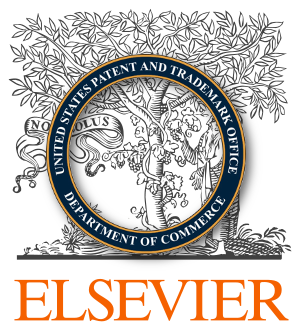
Summary: The EFF’s long fight against patent aggression goes further than just trolls; it now speaks of the role of universities in the problem and the latest nonsense from parasitic academic/scholarly publisher Elsevier
THE EFF recently became vocal about universities that feed patent trolls (in effect turning publicly-funded research into a racket against the public). The goons from Watchtroll shortly thereafter attacked the EFF for saying what it said (we have just mentioned how Watchtroll also defends patent trolls in the Eastern District of Texas using spin and deception).
We agree with what the EFF said, but better yet, tell the universities to stop pursuing patents altogether. People (academics) I know from the universities in Manchester often say they’re against patents in their field (at times altogether) but are required or even pressured by administrators to pursue these, so it really boils down to universities’ patent policy. It can be altered centrally to appease or soften public opinion. These institutions go by their reputation, not their patent portfolio.
Now that the EFF asks universities not to sell patent to patent trolls (the first step in tackling a much broader problem) Red Hat’s opensource.com publishes this article titled “EFF asks universities not to sell to patent trolls”. To quote:
The Electronic Frontier Foundation (EFF), an international non-profit digital rights group, is reaching out to universities and their communities to combat patent trolls.
According to a report published by the Harvard Business Review, patent trolls are deterrents to innovation and drain billions of R&D dollars due to legal costs. The EFF warns that patents may become landmines and may inhibit innovation when a university sells patents to trolls. Universities are drivers of innovation and this purpose is lost when trolls use the patents against organizations that invest in R&D.
The EFF’s new initiative, Reclaim Invention, urges universities to rethink how they use patents by asking students, professors, and other members of the university community to take action by signing a pledge and urging their respective universities to not sell patents to patent trolls.
The Public Interest Patent Pledge (PIPP) is a promise which universities may make by signing the pledge that they will perform a due-diligence exercise before selling or licensing its patents to a third party. The pledge asks universities to assess the business practices of the buying party and ensure that those patents are used responsibly. The hope is that this pledge will discourage any license or sell of the rights of inventions, research, or innovation inadvertently to patent trolls.
This article is a lot better than the attack from Watchtroll (it’s like an attack site) — one which called the EFF “a leftist anti-patent activist coalition” (exact quote).
Another new EFF article, this one composed by Elliot Harmon and Daniel Nazer, reminds us that Elsevier needs to be stopped (and boycotted) for yet another reason. For those who are not aware of the many other reasons to boycott Elsevier, search the Web. There’s no lack of reasons. Here is what Harmon and Nazer published in at least two sites [1, 2]. It’s about a software patent:
On August 30, 2016, the Patent Office issued U.S. Patent No. 9,430,468, titled; “Online peer review and method.” The owner of this patent is none other than Elsevier, the giant academic publisher. When it first applied for the patent, Elsevier sought very broad claims that could have covered a wide range of online peer review. Fortunately, by the time the patent actually issued, its claims had been narrowed significantly. So, as a practical matter, the patent will be difficult to enforce. But we still think the patent is stupid, invalid, and an indictment of the system.
Before discussing the patent, it is worth considering why Elsevier might want a government granted monopoly on methods of peer review. Elsevier owns more than 2000 academic journals. It charges huge fees and sometimes imposes bundling requirements whereby universities that want certain high profile journals must buy a package including other publications. Universities, libraries, and researchers are increasingly questioning whether this model makes sense. After all, universities usually pay the salaries of both the researchers that write the papers and of the referees who conduct peer review. Elsevier’s business model has been compared to a restaurant where the customers bring the ingredients, do all the cooking, and then get hit with a $10,000 bill.
The rise in wariness of Elsevier’s business model correlates with the rise in popularity and acceptance of open access publishing. Dozens of universities have adopted open access policies mandating or recommending that researchers make their papers available to the public, either by publishing them in open access journals or by archiving them after publication in institutional repositories. In 2013, President Obama mandated that federally funded research be made available to the public no later than a year after publication, and it’s likely that Congress will lock that policy into law.
There is already an article about the above, titled “Elsevier’s New Patent for Online Peer Review Throws a Scare Into Open-Source Advocates” (not just those advocates). To quote:
Patents on software can be controversial. And often, so is the company Elsevier, the giant journal publisher. So when word hit the internet starting on Tuesday night that Elsevier had just been awarded a patent for an “online peer-review system and method,” reaction from people aligned with the publishing and open-source worlds came swiftly on Twitter and in other online venues, much of it reflecting suspicion about the company’s motives.
“Elsevier reveals its final form: Patent trolling to destroy scientific peer review,” said one tweet.
Elsevier itself then turned to Twitter in an effort to allay the fears. But its assurances have not quelled the anxieties, particularly those of advocates for more open-source options in scholarly publishing.
The concern revolves around the patent Elsevier received for its five-year-old “article-transfer service,” a propriety online system the company uses to manage journal-article submissions and the ensuing peer reviews.
It is nice to find the EFF raising awareness about these problems and occasionally naming the culprit explicitly, insisting that these “Stupid Patents of the Month” are in fact software patents. There is clearly a patent scope problem and the USPTO needs to correct it in lieu with Alice. █
Permalink
 Send this to a friend
Send this to a friend
Posted in America, Patents at 3:49 pm by Dr. Roy Schestowitz
 Summary: The Eastern District of Texas is being defended by overzealous supporters of software patents as the US continues to slash software patents, citing Alice/Section 101
Summary: The Eastern District of Texas is being defended by overzealous supporters of software patents as the US continues to slash software patents, citing Alice/Section 101
THE USPTO is belatedly (well overdue) working on patent quality and enraging the patent microcosm. As one patent attorney put it the other day, “I’m looking for a link to the MA Dist. Ct decision invalidating patents w/101/Mayo. It is outrageous.”
“Reform or no reform, Congress or no Congress, the courts are doing their job and after the Supreme Court ruled on Alice and Mayo so much has changed for the better.”What makes him say “outrageous” is probably a good thing. It’s just not good for his job, that’s all. His job is more secure if patents are easier to get, i.e. if patent quality declines even further. Looking at some of the latest gossip from IAM, they recall the nearly defunct patent reform in the US (never seriously revisited after last year’s summer vacation) and say: “Ever since the summer of 2015 when the possibility of a vote on the Innovation Act was killed in the House of Representatives, patent reform has remained firmly on the back burner in the US Congress. There has been some discussion around the prospects of venue reform with one bill introduced in the Senate aimed at stopping the kind of forum shopping which means that the vast majority of patent cases are heard in Eastern Texas, but that hasn’t gone anywhere as yet. And with the election just around the corner, most don’t expect anything to happen before the next Congress gathers early next year.”
Reform or no reform, Congress or no Congress, the courts are doing their job and after the Supreme Court ruled on Alice and Mayo so much has changed for the better. Even CAFC, the evil ‘genius’ that came up with software patents several decades ago, is now swatting them like flies (this court is where software patents simply come to die).
“What’s interesting in Hospira v Cubist is the mass invalidation of patents (three in one fell swoop).”Suffice to say, we are not against patents in general. In fact, we tend to only focus on software patents, as we always have done. This new trial in the case of Pure Storage [1, 2, 3, 4, 5], for example, isn’t worth entertaining here, except for reasons that are separate from patent scope (for example, the claim of damages and $14M verdict, which is probably far too much). For a more relevant example see the case against Cubist. It was covered by IP Kat and cited by us a few days ago. Now there is this followup that says: “The IPKat posted a report earlier this week of the case Hospira v Cubist, in which three patents belonging to Cubist were revoked by Mr Justice Carr. A kind reader commented expressing the opinion that the reasons for finding the third patent invalid seemed a little thin. This aspect of the judgment is actually very interesting and was rather glossed over in the earlier post, and so this Kat would like to revisit the topic to look at this one aspect in a little more detail.”
What’s interesting in Hospira v Cubist is the mass invalidation of patents (three in one fell swoop). Is the era of excessive patent litigation in the US over? Is it being reduced to sane levels? Whatever it is, we are increasingly optimistic about the US patent system (unlike the EPO where things keep getting worse).
“As we noted earlier tonight, at long last the USPTO seriously considers Section 101.”The patent law firms just can’t help trying to resurrect software patents which are effectively dead. It’s fun for us to watch. Last week’s article, “Roadmap to Software Patent Eligibility” by Joe Bird of Bradley Arant Boult Cummings LLP, was basically more of the same. The patent law firms are grouping and scratching their collective heads in an effort to work around Alice. Not even corruption of the former Director of the USPTO (official-turned-lobbyist) has helped them undermine Alice.
As we noted earlier tonight, at long last the USPTO seriously considers Section 101. The USPTO’s examiners once again failed to deny a software patent (here is an article about this MacroPoint patent), but that does not mean that US courts will tolerate it. A paper with a stamp on it is not a court order or decree. There are famous trolls in this domain of MacroPoint and if it attempts to actually sue some firm/s we can expect them to risk losing this patent.
“It’s quite likely that all these software patents are next to worthless now.”Speaking of trolls, watch how patent trolls like Intellectual Ventures get mentioned in this Adapt IP tripe. To quote from Yahoo! Finance: “Family Systems has also built many of the patented features into its’ Verbol Voice software prototype that include sophisticated features complimentary to leading services such as WhatsApp.” They’re talking about software patents and say that “[t]his patent portfolio has been cited by companies including Google, Intellectual Ventures, IBM, Chacha Search, RedHat, Microsoft, Xerox, Oracle, HP and SnapChat.”
Cited in what context? And many of the above are proponents of software patents if not patent trolls (IBM and Microsoft sure act like it now). When were these patents cited? Before or after the Alice effect? It’s quite likely that all these software patents are next to worthless now. They’re just a bunch of papers in frames (or without frames).
“Bear in mind that’s a Eastern District of Texas (EDTX) ‘court’, which is notoriously corruptible (the district even advertises its plaintiff-friendly biases).”Speaking of the Alice case and trolls, how about the “post-Halo” world, as MIP put it just before the weekend? We covered the Halo case earlier this year (basically, US patent courts gave a gift to patent trolls) and because of it “[a] jury award to Imperium IP of $6.9 million has been trebled to $20.9 million by an Eastern District of Texas judge [....] In the first case in which enhanced damages were on the table in the Eastern District of Texas since the Supreme Court handed down its decision in Halo v Stryker, Judge Mazzant ruled that Samsung owes plaintiff Imperium IP Holdings treble damages.”
Bear in mind that’s a Eastern District of Texas (EDTX) ‘court’, which is notoriously corruptible (the district even advertises its plaintiff-friendly biases). Watchtroll (IP Watchdog), publishing through Steve Brachmann, a “freelancer [writer] for more than seven years,” is belittling the problem with the rocket docket of patent trolls in Texas (EDTX). Here he is presenting misleading figures to make it seem like there’s no problem with Texas. To quote: “This isn’t the only judicial vacancy which Capitol Hill has been unable to fill in recent days, however. As of Tuesday, August 30th, statistics published online by U.S. Courts indicated that there are 93 total federal judicial vacancies affecting the U.S. system of courts. This includes 32 vacancies which are considered to be judicial emergencies. A judicial vacancy at a district court is considered an emergency when weighted filings are in excess of 600 per judgeship, or the vacancy exists for more than 18 months where weighted filings range from 430 to 600 per judgeship, or the vacancy is at any court with more than one authorized judgeship but only one active judge. U.S. district courts have a total of 72 vacancies, 28 of which are judicial emergencies.”
“But Watchtroll — being the biased site that it is — is selling/delivering an agenda again.”Anybody with half a clue would be able to tell that this is selective use (or cherry-picking) of statistics. We previously showed some statistics about the great role of EDTX in the patent trolling epidemic. But Watchtroll — being the biased site that it is — is selling/delivering an agenda again. We previously mentioned the demise of patent law firms (see NASDAQ’s “Another Intellectual-Property-Law Firm to Close”), with important press coverage soon to be affected by spin/press releases (looking like reputation laundering or distraction from the real news [1, 2, 3, 4, 5]) and certainly they realise that their last remaining haven might be EDTX with its crooked ‘court’ system (barracks of the trolls). █
Permalink
 Send this to a friend
Send this to a friend
Posted in Europe, Patents at 2:38 pm by Dr. Roy Schestowitz
…Just saying there’s hope cannot in its own right make it happen
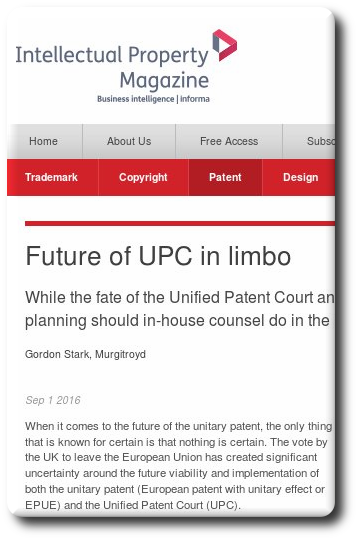
Summary: A UPC-centric event is planned for this week, but the matter of fact is, the likelihood of the UPC ever becoming a reality (in any shape or form) is low and chances of passing it as-is are extremely slim
LATER this month the EPO will promote software patents (disguised as “ICT”) in the US, as we last noted here yesterday. Starting Tuesday, moreover, there will be a pro-UPC event. This was covered a month ago by MIP and recalled in Twitter, where MIP has said: “Join us for #UPC, #UnitaryPatent & #Brexit patent discussions in Munich & Paris on September 6 & 8 – new blog post” (no longer new).
Well, Brexit effectively axed the UPC (without the UK’s participation it’s back to the drawing board), but some try to prop it up anyway, especially Team UPC. The “Future of UPC [is] in limbo,” says the headline of this new article (screenshot above) from a patent maximalism site, Intellectual Property Magazine. As we explained here before (especially back in July), the UPC is effectively dead, if not on the ice for several years to come. The article above is behind a paywall, but here is the publicly-accessible part: [via]
When it comes to the future of the unitary patent, the only thing that is known for certain is that nothing is certain. The vote by the UK to leave the European Union has created significant uncertainty around the future viability and implementation of both the unitary patent (European patent with unitary effect or EPUE) and the Unified Patent Court (UPC).
While a final date for implementation of the unitary patent and UPC had not been set, delivery of these two landmark arrangements was on the home straight. After over 40 years in the making, the UK’s so-called ‘Brexit’ vote threatens to at best delay and at worst derail any chances of the unitary patent and UPC coming into force. So what are the prospects for their continued
“Another positive of the status quo is that the fragmentation of the EU litigation system may also have hindered trolls,” Benjamin Henrion wrote earlier today. He is right. We already covered the trolls angle of the UPC many times before. So did some authors like Dr. Glyn Moody. It’s not a theory or some mere hypothesis; it’s a fact. The UPC is a threat to the EPO itself, as we explained a couple of days ago.
The summary of the above article says: “While the fate of the Unified Patent Court and unitary patent remains undecided, what planning should in-house counsel do in the interim?”
“The UPC is a threat to the EPO itself, as we explained a couple of days ago.”Well, they can carry on as usual and stop wasting time, money and effort trying to usher in what will never happen. The UPC in its previous incarnation is nearly a decade old and it never got close to happening, in spite of all the lobbying and propaganda from the likes of Michel Barnier and Charlie McCreevy. Battistelli himself has lobbied for the UPC for a very long time and now he spends a fortune (at the expense of the EPO) doing these political stunts, presumably to get himself a top UPC position somewhere like Paris, France (based on rumours alone). The EPO even pays to have pro-UPC events in the US (home of the USPTO which is another territory altogether, where US giants pursue far more patents than they bother pursuing in Europe). The angle we typically look for with these events, as was the case in CeBIT and another upcoming US event, is software patents, or what they nowadays call “ICT” as a weasel word. We are also interested in how much money is spent on such events (a lot seems to have been wasted in Canada, as we noted last night). There is a lot of nefarious stuff going on there. For instance, a pro-UPC event in the US was organised with FTI Consulting money (the EPO pays it over a million Euros) sent to IAM, and EPO as the main/sole supporter of the event. How ridiculous is this? Remember that IAM also pretends to be covering news while producing material for the EPO like a propaganda mill.
“Battistelli’s attacks on SUEPO are extremely revealing.”Speaking of propaganda mills, the EPO just can’t help embarrassing itself by 'spamming' universities (at 5:20 AM on a Saturday in this one particular case!). Here is the latest example, about the thirtieth by our count. They are probably running out of European universities to ‘spam’ at this stage, thus choosing smaller and more obscure ones.
What the heck has happened to the EPO I used to respect and send letters to (for constructive thoughts, e.g. regarding patent scope)? My close friend, a university professor who pursued many EPO patents over the years (and got them), has already grown tired of the EPO’s declining quality/status and in his capacity as a head of research department he is now speaking to the university’s administration about reconsideration of their relations with the EPO.
Under Battistelli the EPO truly goes down the drain and unless staff of the EPO is able to put an end to this death spiral there won’t be jobs left for anyone. That would definitely harm Europe and Battistelli can go back to politics (where he came from) if something hits the fan. He’s well beyond retirement age anyway (same as Willy Minnoye, who some people recently thought was leaving).
Just because Battistelli sticks/attaches an “EPO” logo (button) to his lapel doesn’t mean he’s loyal to the EPO. I personally feel a lot more loyal to the EPO than Battistelli has ever been (he is totally clueless about patents and demonstrably averse to science). SUEPO is hardcore loyal to the EPO, and passionate about it too. Battistelli’s attacks on SUEPO are extremely revealing. These attacks have been broadened recently. █
Permalink
 Send this to a friend
Send this to a friend
Posted in America, Patents at 1:47 pm by Dr. Roy Schestowitz
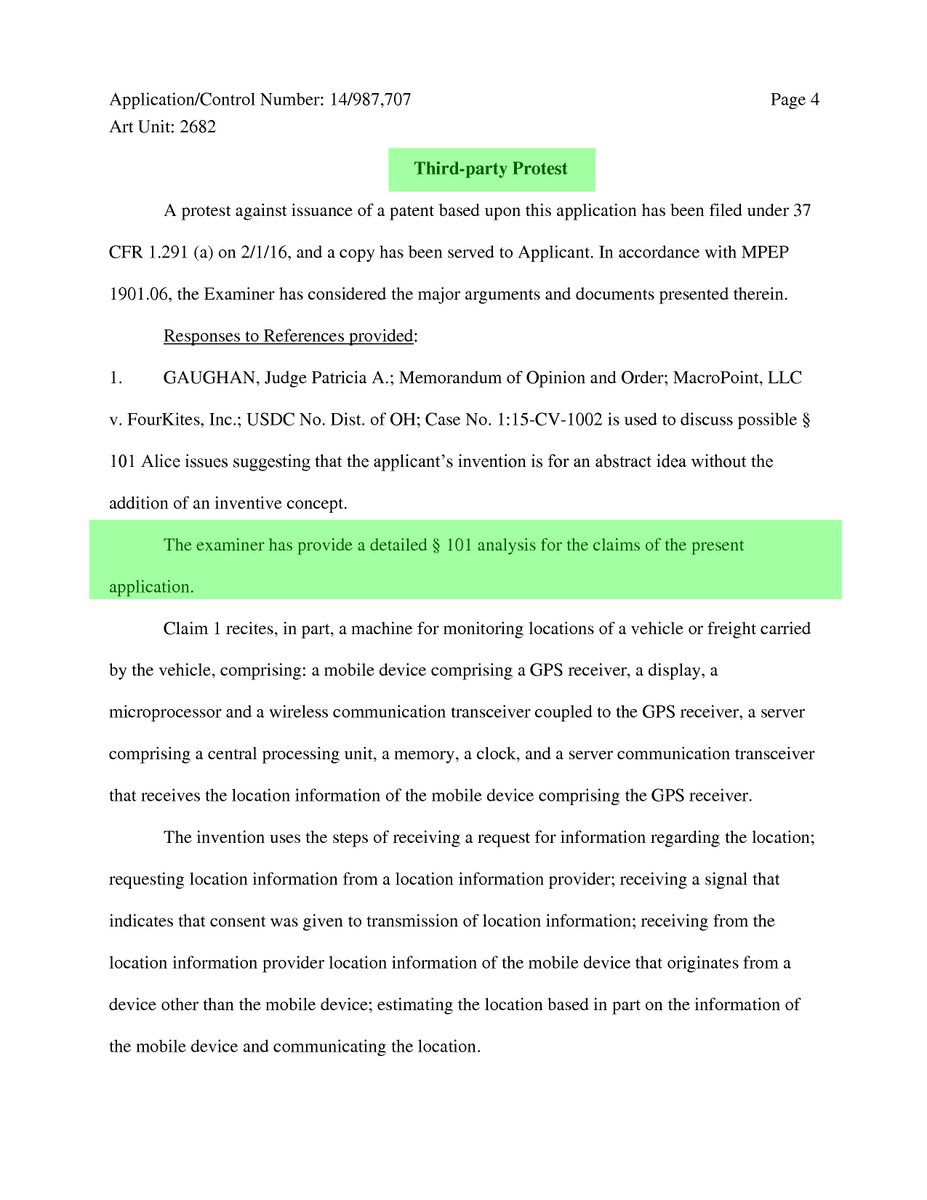
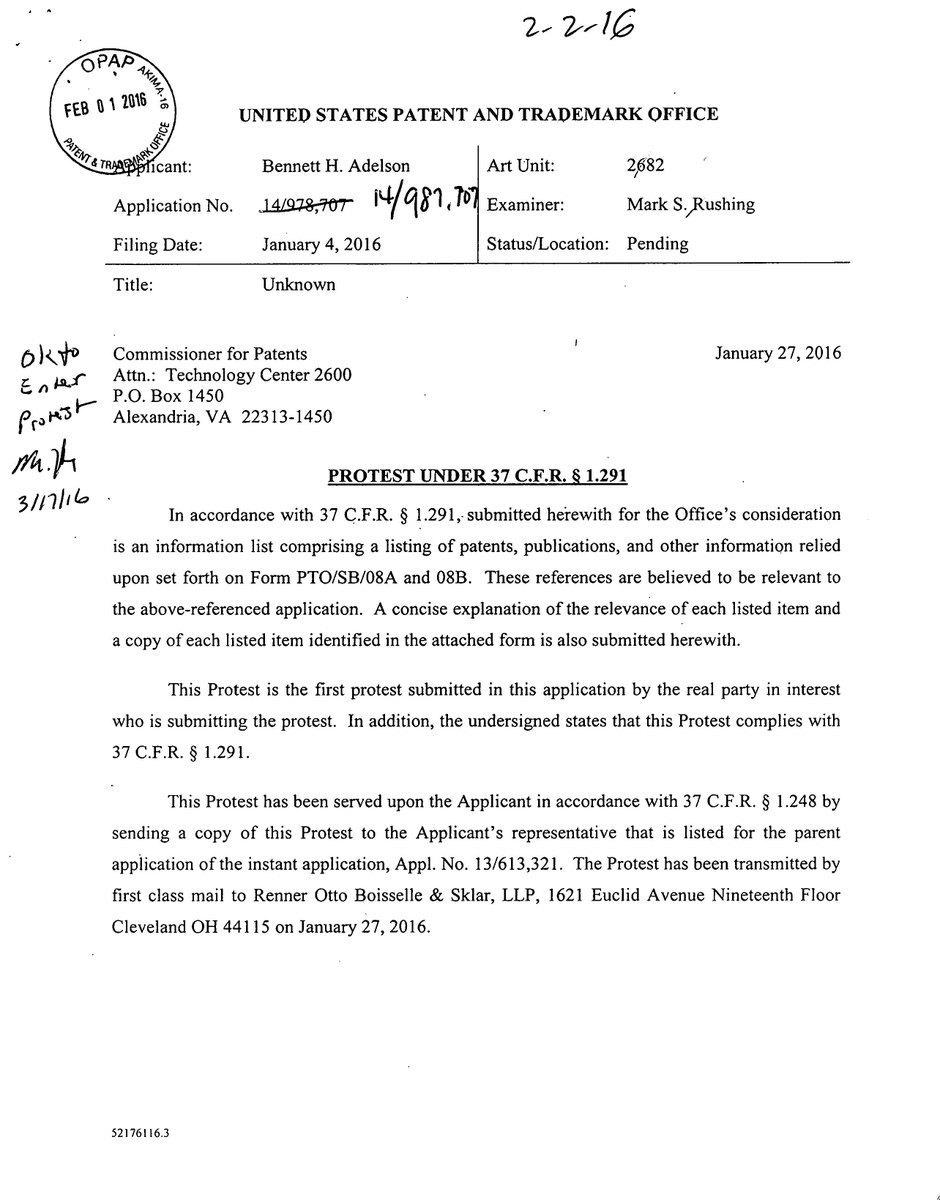
Summary: The US patent office is taking Section 101 seriously enough to reconsider patent applications that it granted or was about to grant, in spite of the temptation to just grant almost anything so as to increase so-called ‘production’ or ‘products’ (the Battistelli way)
THE images above were extracted from a couple of tweets [1, 2] posted a few days ago to speak of an “Interesting [Section] 101 “protest” lodged v #patent in pending case: http://www.prnewswire.com/news-releases/macropoints-latest-patent-related-to-five-patents-already-invalidated-by-fourkites-in-federal-court-300321922.html … check PAIR -Examiner allowed! Here is part of PTO protest document that was unsuccessful in preventing Macropoint patent from issuing…”
“A coordinated retreat of computing to the dark ages of protectionism and requests for permission to code (or buying “computer time” from mainframe giants) have no room in a society that strives to innovate and develop.”Irrespective of the outcome, this glimpse from the inside is helpful and quite informative. We are generally supportive of the USPTO‘s apparent attempt to improve patent quality*, particularly by denying abstract patents on software — like those widely used by patent trolls who prey on small companies. We wouldn’t quite know (one can only estimate) how many small firms settle in secret (under NDAs) with patent trolls. No public cases and no word of mouth exist, leaving us dependent on rumours and rare blog posts, unless it’s a large company that takes the dispute/s into a courtroom.
If the so-called ‘Empire of Corporations’ insists that software should be patentable and their patent lawyers say the same (because they’re paid for it) we should simply ignore them. A coordinated retreat of computing to the dark ages of protectionism and requests for permission to code (or buying “computer time” from mainframe giants) have no room in a society that strives to innovate and develop. █
_____
* When the Office allowed in principle and also actually granted software patents on any conceivable thing expensive litigation (better to settle) became so common and protests against the Office became loud, even inside Congress and GAO.
Permalink
 Send this to a friend
Send this to a friend
09.03.16
Posted in Europe, Patents at 2:54 pm by Dr. Roy Schestowitz
People are leaving the Office a lot faster than the EPO is able to hire replacements

Summary: A report from Canada about the EPO’s oddly-placed booth, whose whole purpose seems to be attracting interest in another continent
THE EPO (see Wiki for background) is burning money or flushing money down the toilet. Insiders worry about it and talk about it. Why aren’t officials or even delegates talking about the unprecedented waste of money? When millions of Euros are wasted on just a few hours of lobbying something is just seriously wrong.
Some time ago we learned about an event held at a congress centre. “The exhibition was reserved to previously registered conference participants,” someone told us, “with something like a £600 fee.” This is quite typical when it comes to such events, where only relatively affluent people are allowed, or people who work for large companies that foot the bill or are partners with the events (e.g. sponsorship). “There was another “cheaper” option (about £175) which was no longer available,” we got told.
“Why aren’t officials or even delegates talking about the unprecedented waste of money?”“Day 1 was open to the general public,” we learned, and “it might have been interesting to go there. Even though I think electric cars are a terrible idea, it would still have interested me to have a good look at that environment.”
Indeed, as it turned out, “exhibitors received a contingent of passes,” which means that EPO staff could probably get in.
Shown above is what was available even for those denied entry (too expensive). “The interesting thing,” we got told, “is that the EPO had a FULL PAGE ad. There were only three of these in the whole brochure: one from the Québec government, the top sponsor, one for the public power utility, which is really an arm of the Québec government, and the EPO. That’s strange, as the EPO isn’t even listed as a sponsor. Two actual sponsors (Nissan and Volkswagen) only had half-page ads, and all the few other ones were quarter-page or even smaller. Obviously quite a bit of money was squandered on this. This is an angle [worth exploring], together with, why should a public authority peddle monopolies like kings did centuries ago?”
“Indeed, as it turned out, “exhibitors received a contingent of passes,” which means that EPO staff could probably get in.”Remember that the EPO is, indeed, a de facto monopoly in Europe. There is no competing office other than NPOs (that are serving a different purpose anyway). “According to the floor map, the EPO booth however was smallish,” we were told. “The EPO web site appears to indicate this was foreseen as a recruiting event, but this must be an instance of bad timing, as there are currently no openings for scientists and engineers.”
Well, that was then. Right now the EPO is very desperate for applicants/applications as staff is fleeing (more on that to be published soon).
“There was a paper presented by one Gilles Schmitt,” we were told, “who appears to be a more junior examiner. One person of the same name is mentioned in two electric-vehicle related patent applications from 2007, so if this is the same person, he couldn’t have been there for more than 10 years. He couldn’t be a director with that seniority, unless he was very eager.”
“The interesting thing is that the EPO had a FULL PAGE ad.”
–AnonymousThe title of his talk: “Patents and progress; intellectual property showing the future of electric vehicles” (a subject which is sometimes being pushed for marketing purposes in Twitter).
That whole charade took place quite some time back and in the mean time we saw this tweet from CIPA being promoted by the EPO (see below). █
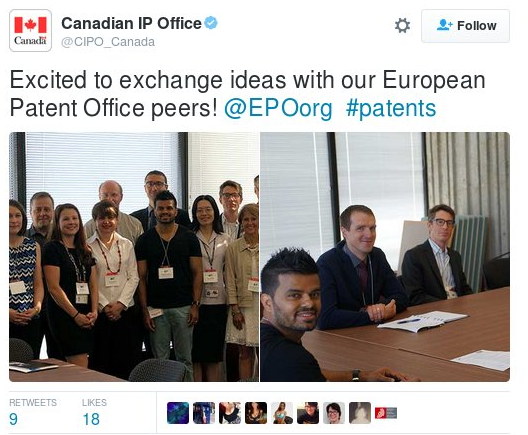
Permalink
 Send this to a friend
Send this to a friend
Posted in Courtroom, Europe, Patents at 2:07 pm by Dr. Roy Schestowitz
Where Battistelli and his goons arrogantly refuse to obey court orders

Summary: Details about the latest developments in the union-busting campaign of Battistelli at The Hague, where Laurent Prunier and colleagues who are staff representatives face “demonstrably fabricated accusations,” according to Prunier
The disciplinary case of Laurent Prunier became more public a few months ago and we saw some details about it (both before and after). The atmosphere of sheer fear limits communication about these cases (there are threats being made to prevent/limit communications), but without any outside access to information the thugs who manage the EPO after a de facto coup can do just about anything without facing scrutiny, judgment, sometimes even backlash. That’s just what they want and to help them maintain this secrecy isn’t necessarily helpful (they eventually do whatever they please, experiences in Munich show). The significance of the attack on Prunier is that attacks on unions became apparent not just in Munich but also in The Hague (maybe Berlin too is somehow affected). Already, bearing in mind what we wrote about Mr. van der Eijk (the name indicates which country he is from) in past years, there were allegedly attacks on his independence at the boards. The latest message from AMBA says: “The present situation seems to be that the Boards of Appeal are now constituted within the BoAU, that the post of President of the Boards of Appeal is not yet occupied, that Mr van der Eijk is acting President of the Boards of Appeal, but that no power has been delegated to him. Thus, the President of the European Patent Office can be seen as exercising direct control over the Boards of Appeal.”
Feedback from Laurent Prunier, a SUEPO Secretary, was sent to us yesterday. Recipients were, as expected, colleagues from The Hague. Some of them deemed it worthwhile passing it on and after thinking about it for longer than a day I decided that portions of the message deserve to be publicly available, for Prunier’s protection (as when the public/press is aware of the situation there’s less leeway for this charade to carry on). We are aware of at least one more case which is similar to that of Prunier, culminating in a letter of dismissal. It’s often disguised as “health reasons” to hide the real motivations, such as union-busting endeavors.
Here are some selected bits (DG4 is Željko Topić, who apparently plays a big role in this attack, having done similar things in Croatia):
The Netherlands, 01-09-2016
Dear colleagues, Chers tous,
I hope this letter finds you well. This report is a little longer than usual because there have been new developments; it covers the months of June to August included. Once more UN GRAND MERCI for your solidarity, which allowed me to stay afloat [...] DG4 did not want to recognize my sick leave, in spite of valid medical certificates. They put me on unauthorized absence1 and cut 100% my remuneration as from January 2016. The Office has now changed tactics. At the end of June2, I have been suspended with immediate effect “awaiting trial” for alleged misconduct.
The letter of suspension was another punch in the stomach that left me knocked out for several days (by the way, thanks to those of you who sent me messages). As you may imagine getting back a stable health condition in such circumstances is a real Sisyphean task. Each new punch wastes the forces recovered from the previous one. But I will continue to defend my rights by all legitimate means: what is done to me may be tomorrow done to you; all this happened in the course of and because of my activities as staff/union representative. I thus sense it is my duty not to throw in the towel.
The Codex does not allow me to share the insights with you but:
• I firmly deny any wrongdoings.
• The whole is a genuine insult to anyone’s intelligence. The file against me contains so many demonstrably fabricated accusations that I have little doubt I can defend myself – or, rather I would be able to if, our internal system were not what it is currently, a kangaroo court.
The terms of the suspension
No date for the “trial” has been set, but I am “forbidden to enter any EPO premises as well as ordered not to travel away from The Hague without permission of the Office and to remain available for delivery of further correspondence and contact with the Office in (my) official address”. Basically, I am assigned to home arrest without any indication of the duration. The alleged legal basis for this restriction is Article 23 ServRegs – which does not concern suspensions. Just to illustrate the creativity of DG4 when it comes to use and misuse legal provisions to serve their ends.
______
1 In the meantime (on 26.07.2016), I received a letter from the Chairman of the Administrative Council concerning my Request for Review addressed to the Administrative Council (AC) on this matter. On 4th April 2016 my lawyer asked them to review my placement on unauthorized absence in spite of valid medical certificates. My lawyer asked the AC to review the matter since the President and his associates have an obvious conflict of interest, having expressed publicly and repeatedly their aversion to me. Well, Mr Kongstad informed me that since I wasn’t nominated by the AC, the AC does not see itself in charge of reviewing my RfR, and considers that the Office should deal with the RfR. My RfR will thus be examined by those who are causing my troubles, and who in fine, will take the decision on my internal appeal. So much for impartiality, conflict of interests and independence of judiciary vs. executive.
2 Also worth being noted, my suspension occurred only a few days after SUEPO filed a Kort Geding with the Court of Justice in The Hague to challenge its harassment by the Office. I can already hear VP1 muttering “pure coincidence”…
I was also ordered to hand back my EPO badge, my offices keys, laptop, mobile etc. This had to be done urgently but I was informed that my badge had been de-activated and the lock of my office had been changed in my absence (!) These orders had thus no purpose other than humiliation.
According to the Codex the suspension can last for a maximum four months (in my case this means up to end October 2016), but there too I remain prudent since the way DG4 interprets the Codex may deviate from its literal wording.
The suspension letter further states: “You shall receive your full salary; however the Office reserves its right to impose a deduction thereof under Art. 95(2) ServRegs if grounds for that arise”.
Again DG4 cannot help itself to systematically formulate the perspective of even more sanctions, always in unclear circumstances, so as to maintain a constant psycho-threat on those they target.
The consequences of the suspension
In July my “full salary” actually amounted to 1***EUR (!) only since… the EPO levied 3*** EUR as contributions for health and pension, retroactively from the date of my placement in unauthorized absence at the beginning of 2016. Another 1*** EUR for “arrears in June” was also retained (the explanations provided so far are cryptic to me). In August however my salary was finally paid in full for the first time since 01.01.2016. [redacted].
[...]
And other emergencies there will be. In March the Administrative Council adopted the resolution CA/26/16, urging the President to take concrete steps to de-escalate the social tensions. We all expected them to follow-up on this matter. They did not: in the June council, they only had time to try and fix the President’s attempts to extend his claws on DG3. Legitimate as that concern was, it is disappointing that they did not have time to tackle social issues. Given the fate of Staff and Union representatives, unjustly accused and punished [redacted]
Thus, not only your donation will have helped me to stay afloat, but if justice is done, it will also help others.
Again MANY THANKS for your support. Without you I would have faced harsh problems on the top of the “special treatment” by DG4/Mr Battistelli. This proves again that solidarity is the only way to move forward in our present work environment.
[...]
It looks as though Battistelli and his goons may be preparing to do in The Hague what they already did in Munich, having made it abundantly clear/explicit that they don’t give a damn about what Dutch courts say. How can anyone step aside at this sight of gross injustice? What has Battistelli turned the EPO into? █
Permalink
 Send this to a friend
Send this to a friend
Posted in Europe, Law, Patents at 1:25 pm by Dr. Roy Schestowitz

Summary: Some privacy takeaways from the analysis of Bretton Woods Law (commissioned by EPO staff) and more examples of serious privacy violations inside the European Patent Office
PRIVACY is significantly eroded by authoritarian regimes for the purpose of crushing dissent and the European Patent Office (EPO) is no exception. Eponia is highly authoritarian and it even hired autocrats like Željko Topić for top positions. A lot of the illegal surveillance inside the EPO began or culminated around the time people were chatting about criminal charges against him (for sure a story worth telling one day).
A letter was sent to Heiko Maas, Federal Minister of Justice and Consumer Protection in Germany, just over a couple of months ago. “A SUEPO lawyer addressed Heiko Maas and informed him of the latest reforms and developments at the EPO,” explained an insider. Suffice to say, Maas has done virtually nothing (he has a reputation for this in Germany), but let’s assess the privacy violations based on another legal office. A few days ago we saw the following new comment in IP Kat:
The EU data protection Regulation does not apply everywhere in Europe. For example, the European Patent Organisation (EPO) has its own data protection Regulation.
The document “BREACHES OF BASIC AND FUNDAMENTAL RIGHTS AT THE EPO” by Bretton Woods Law (Specialists in Public International Law) explains (from page 17 to 23) why the EPO data protection regulation fails to meet the standards of both EU data protection law and the national data protection laws of the Contracting States.
https://www.suepo.org/documents/43577/55400.pdf
Summary of deficiencies in the current EPO data protection framework:
- Fundamental rights: The reference to the respect of fundamental rights had been removed from the EPO data protection regulation (page 18).
- Lack of independent oversight: At the EPO there is no independent supervisory authority. The EPO president supervises himself the data processing he has implemented. (page 21)
- Change of purpose: The EPO data protection regulation allows the EPO President unilaterally to decide that data may be processed for purposes other than those for which they have been collected.(page 21)
- Transmission to recipients outside the European Patent Organisation: The EPO President may authorise a transfer or a set of transfers of personal data to a third country or international organisation which does not ensure an adequate level of protection.(page 21)
- Lack of any effective means of redress in circumstances where the rights of data subjects are infringed (see pages 22 and 23 – the intervention by the German data protection authorities).
Conclusion:
A wide range of personal data from both patent applicants and EPO staff are processed at the EPO. The situation at the EPO falls far below the standards expected and the rights enjoyed by citizens in the rest of Europe.
The above reminded us of what the EPO does with Europatis — a scandal which we covered here last year in the following articles:
- Jacques Michel (Former EPO VP1), Benoît Battistelli’s EPO, and the Leak of Internal Staff Data to Michel’s Private Venture
- Europatis: “Turnover of €211,800 and Zero Employees”
- Loose Data ‘Protection’ and Likely Privacy Infringements at the EPO: Here’s Who Gets Employees’ Internal Data
- Summary of the EPO-Europatis Series
- Revolving Doors of High-Level EPO Management: Jacques Michel and the Questel Deal With the EPO
Privacy violations are so serious inside the EPO that detailed accounts of mock trials or investigations are being ‘leaked’ by EPO management to the media, in order to essentially defame the accused (a judge in one case). One of the reasons for strong data protection around one’s medical record is the potential for blackmail and discrimination. In light of this we’re reminded of a document we saw several months ago (it’s a letter to Mr. Topić actually). It spoke about the unacceptable state of medical data protection at the EPO (it would be totally unthinkable at the USPTO). Here is the complete text
European Patent Office | 80298 MUNICH | GERMANY
Mr Željko Topic
Vice President DG4
R. 707
European Patent Office
80298 Munich
Germany
Central Staff Committee
Comité central du personnel
Zentraler Personalausschuss
Tel. +49 -89- 2399 – 4355
+43 -1-52126 – 305
+49 -30-25901 – 800
+31 -70-340 – 2028
centralSTCOM@epo.org
Reference: sc16075cl –0.3.1/4.3
Date: 14.04.2016
Nomination of Ms R. de Greiff as Director Health and Safety
Dear Mr Topic,
On 24 March 2016 you announced on the Intranet the appointment of Ms Raffaella de Greiff as new Director Health and Safety with effect from 1 April 2016, this after serving as ad interim Director of one of the two EPO medical departments since Dr Koopman retired almost two years ago.
Ms de Greiff has a degree in “industrial relations” but no medical qualification. A non-medical person can manage a medical unit, but normally only subject to certain strict requirements:
● medical confidentiality is respected;
● non-medically qualified managers do not have access to any medical information;
● medical files and H&S staff when handling such files remain under the direct supervision of medical doctors;
● medical doctors remain free to carry out their medical duties without interference from managers in medical issues.
So far, the Office has not introduced any such formal guarantees and safeguards.
We refer in particular to the Gazette of January 2016, page 20, which includes a diagram showing that the units that administer such medical files (“Medical advisory and general administration” and “Occupational health and safety”) are under the direct authority of the Health & Safety Director and not of the medical doctors (medical advisor or OH physician), who instead appear to enjoy a consultancy role. The whole Health & Safety department led by Ms de Greiff is in turn under the authority of Ms Bergot (PD Human Resources). This new structure is problematic in several respects.
Firstly, Ms de Greiff is neither bound to nor protected by the Hippocratic Oath. If Ms Bergot, as her superior, demanded access to information from the medical file of a staff member (be it a MAU or an OH file), then Ms de Greiff would not have the authority to refuse such an order; neither would she be able to intervene if PD43 were to obtain medical information by other means.
In other words, the strict confidentiality of staff medical files kept in the EPO can no longer be guaranteed.
Secondly, medical doctors are responsible for ensuring the confidentiality of any and all medical data in their possession. If it cannot be guaranteed that non-medical personnel will not have access to medical information, then medical ethics oblige the doctors not to enter or amend any staff data, collected either by themselves or by external doctors working for the EPO, in the EPO medical databases. If they did nonetheless, they would risk losing their medical license.
Under such circumstances, it is unclear how the EPO medical department is supposed to function properly.
Thirdly, we have already raised a number of questions concerning the MAU which to date have never been answered. With the new structure, similar concerns now also apply to the former Occupational Health Department.
We respectfully request you to acknowledge receipt of the above
observations and take a position on them.
Yours sincerely,
The Central Staff Committee
cc.:
Mr B. Battistelli; President of the EPO
Ms Dr Bosch and Mr Dr Schüder
Ms R. de Greiff
Ms E. Bergot
This medical data protection letter, contained in the original PDF, has the signatures of many staff representatives, not just SUEPO representatives. This is an important letter regarding a serious problem which is widely known about (word of mouth and more). When will the EPO realise that this is totally unacceptable in the 21st century? In this particular case the abuse of privacy of staff cannot even be excused/justified using a war on unions/dissent/whistleblowers. It’s just an authoritarian regime’s dream. █
Permalink
 Send this to a friend
Send this to a friend
« Previous Page — « Previous entries « Previous Page · Next Page » Next entries » — Next Page »



 Summary: The Eastern District of Texas is being defended by overzealous supporters of software patents as the US continues to slash software patents, citing Alice/Section 101
Summary: The Eastern District of Texas is being defended by overzealous supporters of software patents as the US continues to slash software patents, citing Alice/Section 101






















 Content is available under CC-BY-SA
Content is available under CC-BY-SA